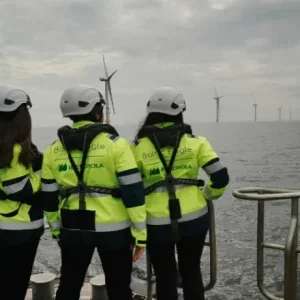The decision means that the facility will achieve the necessary Renewables Obligation accreditation by the end of the month to allow it to proceed, in what will be a major boost for Scotland.
The prototype facility, which will be constructed at Global Energy Group’s Nigg facility in the Highlands, will put Scotland at the forefront of developing this innovative technology which can be deployed in deep water rather than just in the shallower waters, such as those off the East Coast, as at present.
The twin turbine project will be capable of generating 10MW of electricity, enough to power around 8,000 homes. By opening up the deeper waters off the North and West Coast of Scotland the new floating windfarms can make a significant contribution to helping Scotland meet its renewable energy targets.
Welcoming the granting of planning consent Jack Farnham, Senior Developer for RES & Consents Manager for Dounreay Tri, said, “We are delighted that Scottish Energy Minister, Paul Wheelhouse MSP, has granted planning permission for Dounreay Tri.
"It will be a major boost for Scotland as not only will this facility be constructed and maintained in Scotland but it opens up the possibility for Scotland in leading the world in this technology. This type of facility is potentially deployable in many more locations around the world than conventional offshore wind.”
Speaking on behalf of Hexicon, the parent company of the Dounreay Tri, which developed the technology, Marcus Thor, the Dounreay Trì Project Director, said, “It is fantastic news for Hexicon that the Dounreay Trì project has permission to proceed.
"We are grateful that Scotland is taking positive steps to lead in the development of this innovative technology. Hexicon is encouraged that this demonstration plant will lead to the deployment of many more floating windfarms around the world.”
The next steps for the project is to formally reach the final investment decision and then it needs to be constructed, installed and commissioned by 30 September 2018 under the terms of the Obligation Certification regime.






